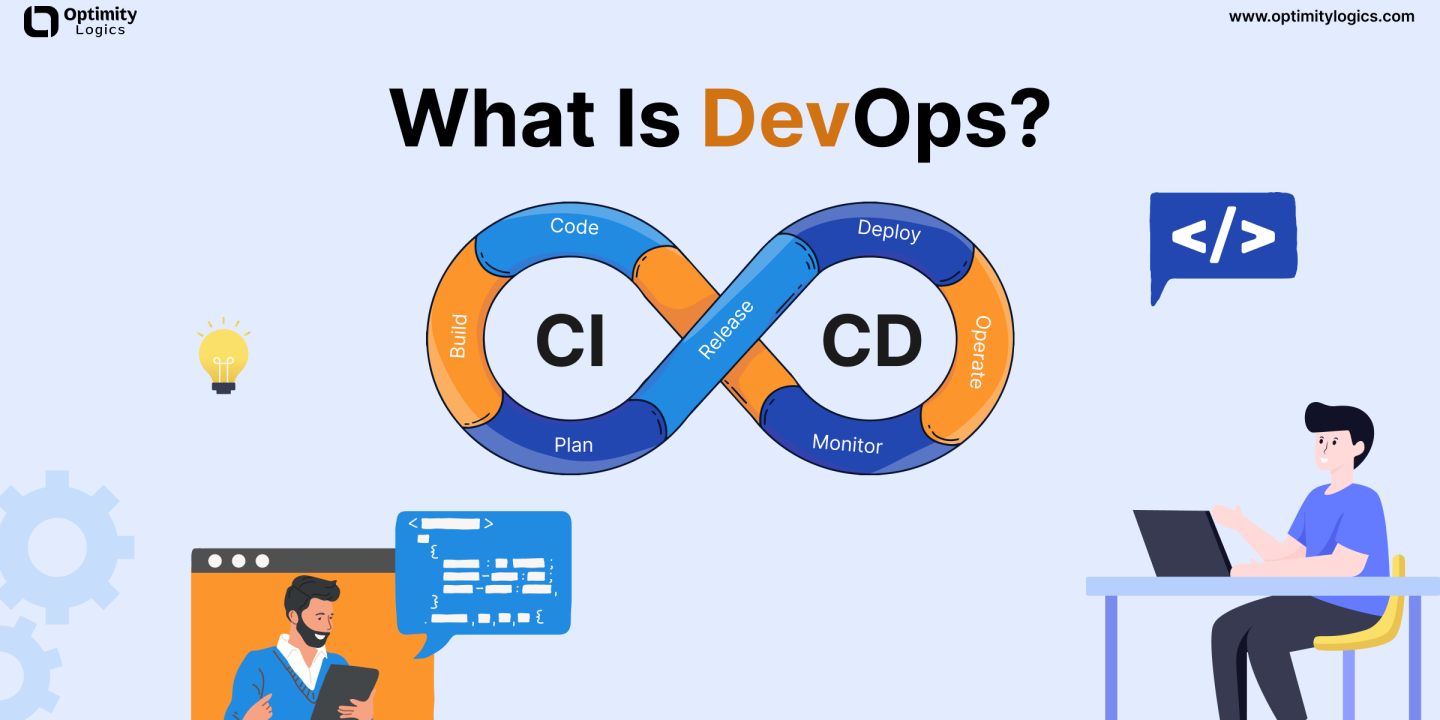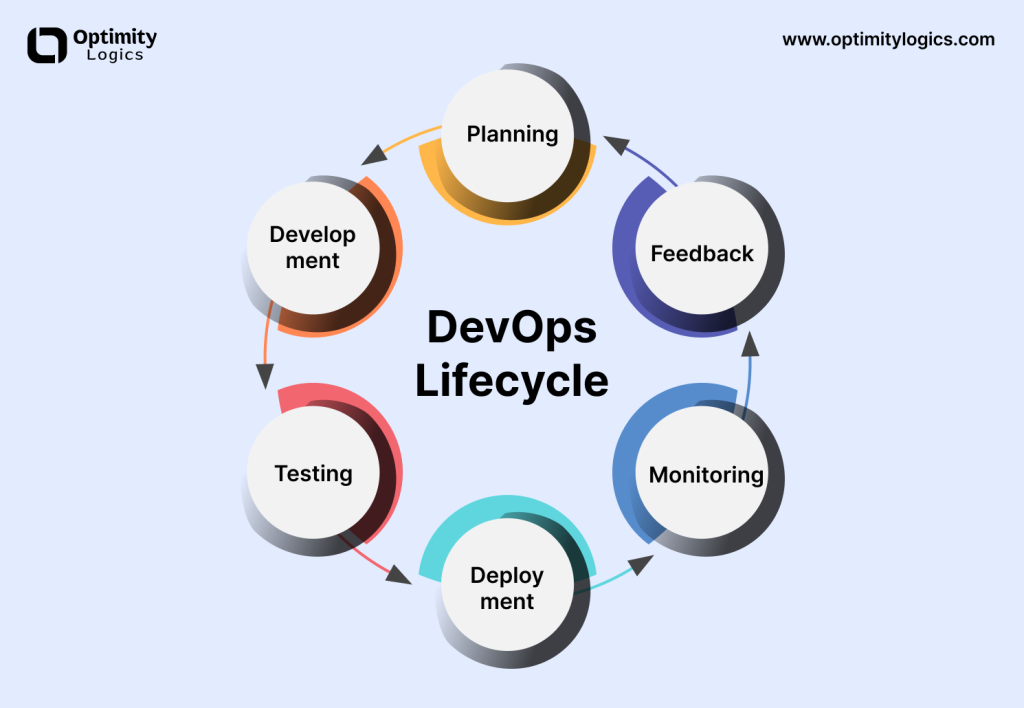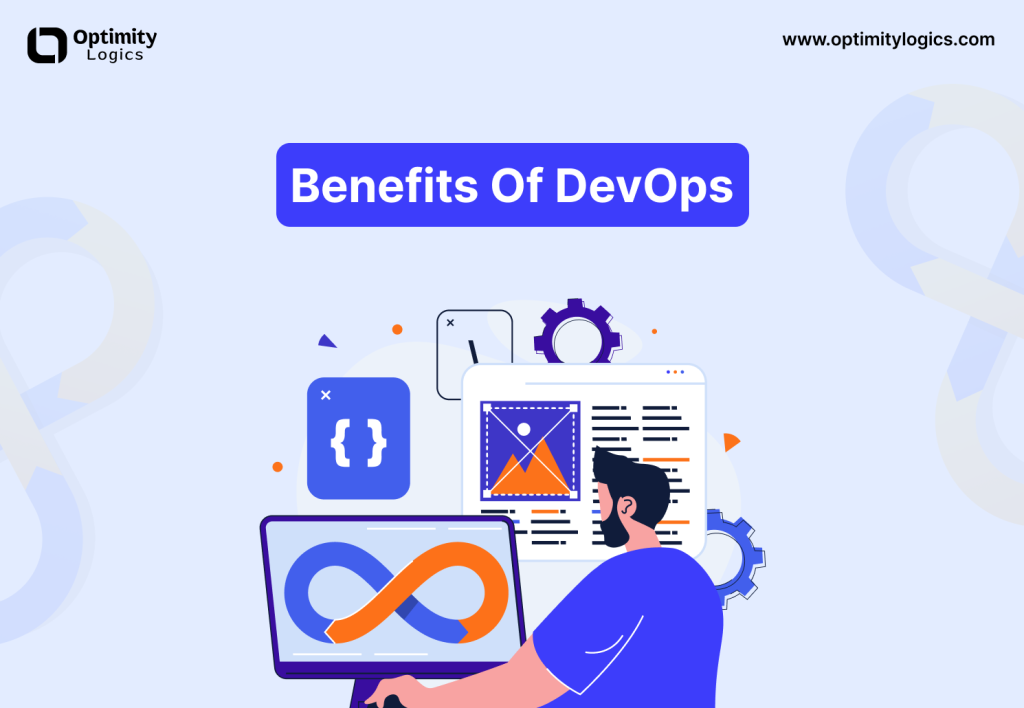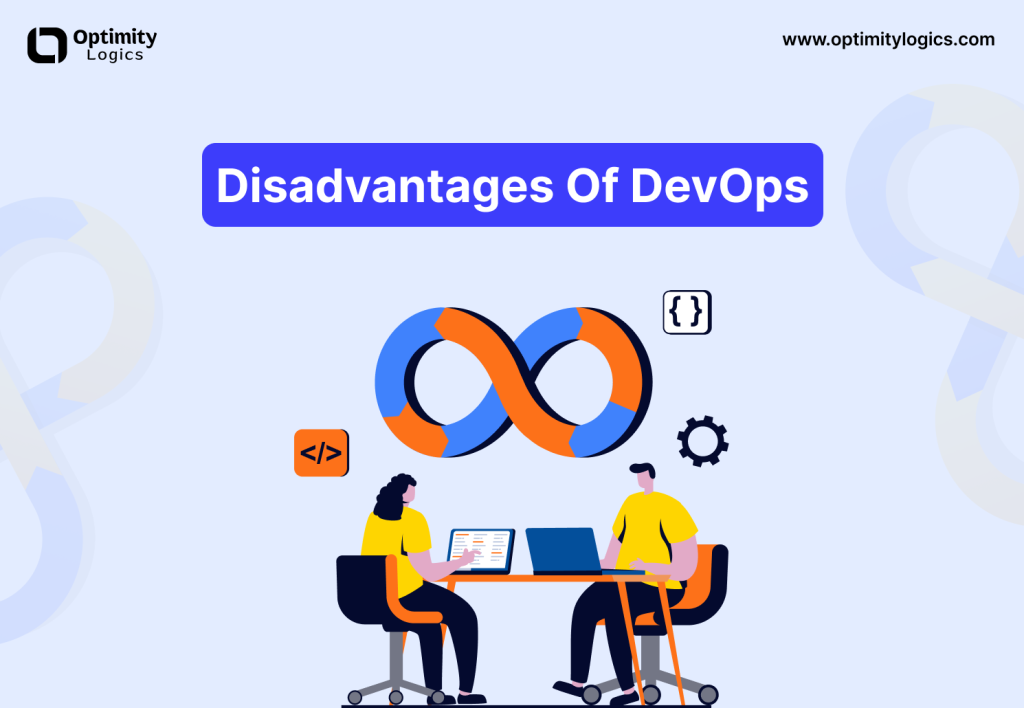
DevOps is a philosophy, methodology, and set of tools that aim to bridge the gap between development and operations teams. These teams have typically been divided into segregated departments, with operations teams handling code deployment and maintenance and developers creating the actual code.
This may result in ineffectiveness, a breakdown in communication, and a delay in providing users with bug patches and new features. The fusion of “Development” and “Operations,” DevOps represents a cultural and technological shift, breaking down traditional silos between these two critical aspects of the software development life cycle. Optimity Logics unlock the DevOps topics like What Is DevOps, Features, Pros, Cons, Methodology etc.. Let’s start with our Experts, the complete DevOps guide to the basics.
What Is DevOps?
What Is DevOps? Well, DevOps is a combination of “Development” and “Operations”. DevOps is a set of practices, principles, and cultural philosophies aimed at improving collaboration and communication between software development (Dev) and IT operations (Ops) teams.
The primary goal of DevOps is to streamline and automate the software development lifecycle, from the initial planning and coding phases to testing, deployment, and ongoing maintenance.
The DevOps describes the adoption of iterative software development, automation, and programmable infrastructure deployment and maintenance. The agile testing technological project or software to business requirements.
Most importantly, DevOps can change the software delivery chain, services, job roles, IT tools, and best practices. DevOps is not a technology, that is, environments generally apply common methodologies.
Key Phases of DevOps Life cycle

1. Planning
The whole DevOps process is built around the planning step. It includes determining the needs, specifying the project’s parameters, and establishing targets. So,Creating the project’s timetable and plan is another task during this phase.
2. Development
Once the planning phase is complete, the development phase kicks in, which includes writing code, designing software, and building applications. Continuous integration and testing are also important parts of this stage to ensure that the code is of high quality and is ready for deployment.
3. Testing
The development team verifies the software’s quality throughout the testing step of the DevOps cycle. So, Unit testing, integration testing, automation testing, performance testing, and security testing are some of the testing methods use. Finding and fixing problems as well as making sure the programme complies with the requirements are the goals.
4. Deployment
The programme is release to production during the deployment phase. Since any mistakes or problems during this period might have serious repercussions, meticulous planning and execution are necessary. Also, Teams can deliver changes to production faster and more effectively using continuous deployment.
5. Monitoring
Teams now closely monitor the software that is being produced. Also, It entails monitoring performance, reviewing records, and determining any problems that may emerge. So, Ensuring the seamless and effective operation of the DevOps process is the aim.
6. Feedback
The feedback phase facilitates the collection of user and stakeholder input, which may then be utilised to pinpoint areas in need of enhancement and to direct further development endeavours.
Benefits Of DevOps

- Faster To Market Risk
DevOps architecture empowers organizations to accelerate the delivery of software updates and new features while maintaining high quality. Through the automation of various software development, testing, and deployment processes, organizations can minimise the time needed to transition code from development to production, ultimately leading to quicker time-to-market. - Improved Collaborations
DevOps architecture fosters collaboration between development and operations teams, helping to break down silos and enhance communication. So, This teamwork ensures that everyone is align with the same objectives, reducing the chances of misunderstandings and delays. - Scalability
DevOps architecture plays a crucial role in enabling organizations to efficiently expand their software development and operational processes. Through the utilisation of cloud computing and virtualization technologies, organizations gain the ability to swiftly allocate and adjust resources in line with evolving requirements, thereby ensuring they always have the necessary resources to meet changing demands. - High Quality
DevOps architecture is vital for organizations aiming to streamline their software development and operational processes. By leveraging cloud computing and virtualization technologies, companies can quickly allocate and adapt resources to meet evolving needs, ensuring they always have the necessary capacity to address changing demands.
Disadvantages Of DevOps

- Complexity
Implementing and managing DevOps architecture may be challenging, especially for organisations that are unfamiliar with this methodology. Also, DevOps procedures and technologies can have a high learning curve and require time to fully deploy and optimise. - Security Risk
The software development life cycle may face additional security threats as a result of the automation and integration of operations and development activities. To reduce these dangers, organisations must exercise caution when it comes to security and put in place the necessary safeguards. - Tool Overload
A variety of tools and technologies are use in DevOps architecture to automate and optimise activities. Although this has several benefits, it may also result in tool overload, which makes it challenging for businesses to efficiently manage and maintain their toolkit. - Cultural Resistance
It might be difficult for companies with more compartmentalised cultures to collaborate and communicate throughout teams while using DevOps architecture. Another barrier to DevOps adoption may be resistance to change, especially in companies where conventional waterfall development methods are preferred.
Conclusion
Because DevOps is an iterative process, companies should prepare to make several adjustments and adjustments. By being willing to iterate, businesses can ensure that their DevOps implementation can alter and grow as the needs of the business do.
The DevOps solutions team must adhere to the values that promote cooperation and communication. Businesses may ensure that information is shared efficiently and promptly between programmers and operational staff by promoting a sharing culture. In addition, promoting reciprocal communication among team members will facilitate the growth of mutual respect and trust. If you have any queries, send a message to the chat box and talk with Optimity Logics experts!












